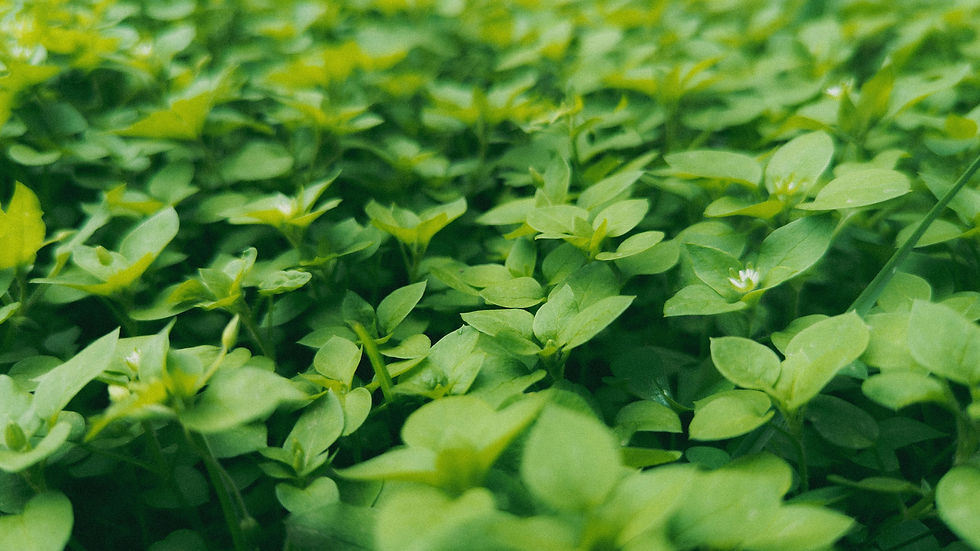Garden Weeds Are Telling You Something—Are You Listening?
- Angela
- Feb 28, 2025
- 3 min read
Most gardeners see weeds as a nuisance, but what if they were actually trying to tell you something? Before you yank those suckers out, take a moment to observe—because weeds are nature’s way of diagnosing your soil’s condition. Each type of weed thrives in specific soil conditions, giving you clues about what might be missing or imbalanced in your garden. By understanding these signals, you can improve your soil organically and create a healthier, more productive garden.
Five Common Weeds and What They Reveal About Your Soil

Dandelions (Taraxacum officinale) – Low Calcium, Compacted Soil
Dandelions aren’t just delicious weeds—they’re big soil indicators. Their deep taproots break up compacted soil and pull up essential nutrients, particularly calcium, making it more available to surface plants. If dandelions are thriving, your soil likely needs aeration and mineral replenishment.
Beyond calcium, dandelions also help fix:
• Potassium – Extracted from deeper layers to support plant growth.
• Iron – Accumulated in the roots to correct surface deficiencies.
• Magnesium – A sign that your soil may be lacking this vital nutrient.
Organic Fix:
• Try making compost tea by soaking dandelions in water for a couple weeks. By doing this, you extract the nutrients from the plant and can water them into your soil.

Clover (Trifolium spp.) – Nitrogen Deficiency
Seeing clover spread across your lawn or garden? That’s a sign of nitrogen-poor soil. Clover has the unique ability to fix nitrogen from the air into the soil, helping to naturally restore fertility.
Organic Fix:
• Plant nitrogen-fixing crops like beans or peas.
• Apply composted manure or alfalfa meal to boost nitrogen levels.

Chickweed (Stellaria media) – High Fertility, Moist Soil
Chickweed thrives in nutrient-rich, moist soil. While that might sound great, it can also indicate poor drainage or overly fertile conditions that encourage weed growth. On the plus side, it will tell you that you have a neutral pH in your soil.
Organic Fix:
• Improve drainage with compost and organic matter.
• Avoid over-fertilizing to prevent excessive weed growth.

Plantain (Plantago major) – Compacted, Poorly Drained Soil
Broadleaf plantain is an indicator weed of alkaline soils (high soil pH) with low fertility, soil compaction with poor drainage - often where foot traffic is high. Its deep roots loosen soil and draw up nutrients, but its presence suggests your garden beds need aeration.
Organic Fix:
• Loosen soil with a garden fork or broadfork.
• Apply mulch and compost to improve soil structure.

Docks (Rumex crispus, Rumex obtusifolius) – Low Fertility, Poor Drainage, Acidic Soil
Docks have very deep, sturdy taproots that allow them to thrive in compacted, poorly drained, and acidic soils. These roots mine for minerals like:
• Phosphorus – Docks can accumulate phosphorus, making it more available when they decompose.
• Potassium – Like dandelions, docks bring potassium from deeper soil layers.
• Iron & Magnesium – They also thrive where these micronutrients may be lacking in the topsoil.
Organic Fix:
• Aerate the soil and improve drainage with compost and organic matter.
• If soil tests confirm high acidity, apply agricultural lime to balance pH.
• Use mulch and cover crops to improve overall soil structure.
So, before you pull those weeds, take a closer look. Instead of seeing weeds as enemies, think of them as soil indicators. They are nature’s way of healing the land and filling gaps where conditions are poor. By recognizing what they’re telling you and amending your soil accordingly, you’ll create a more balanced and productive garden—naturally reducing weed pressure in the long run.
What story is your soil trying to tell you?







Comments